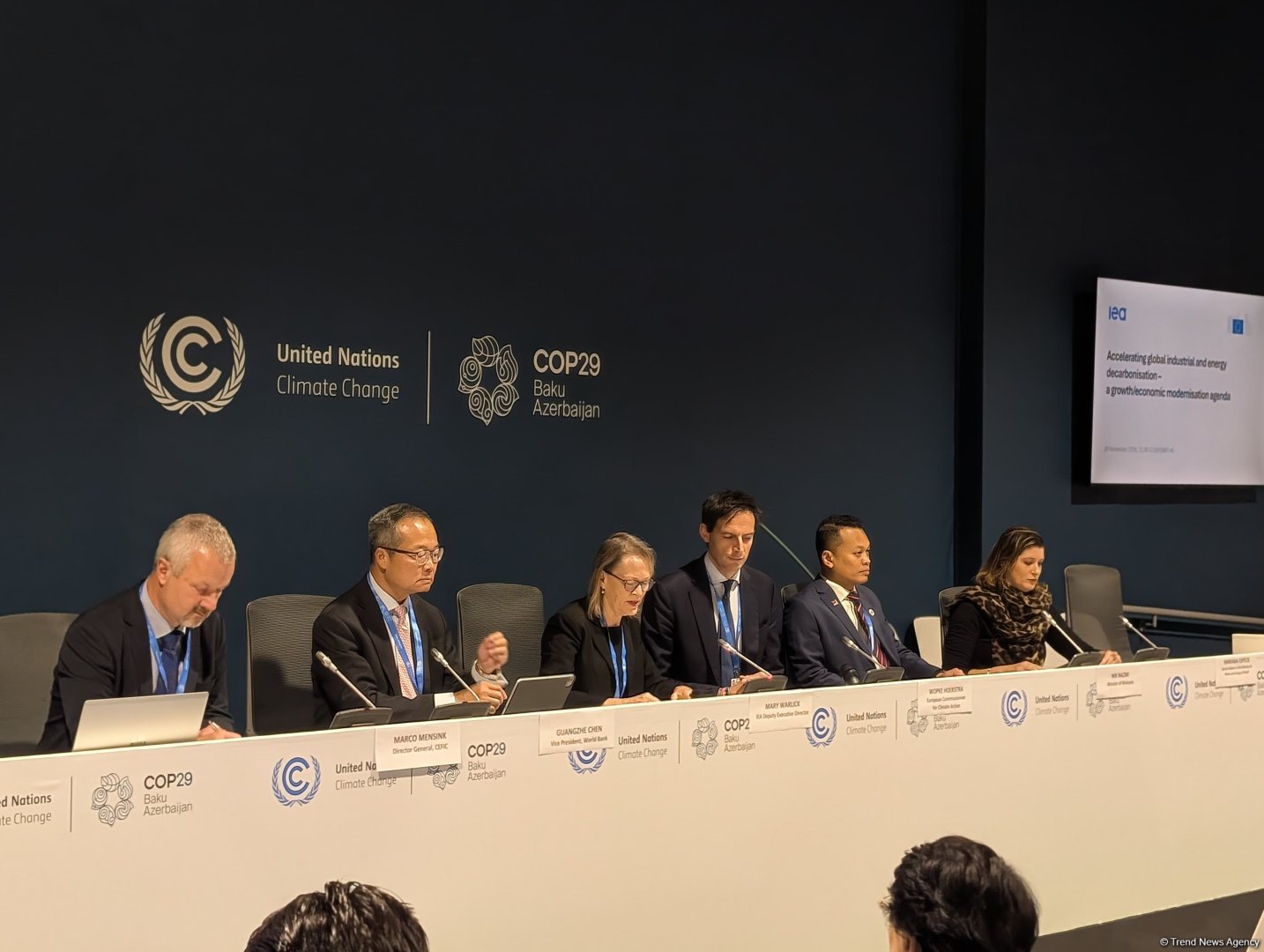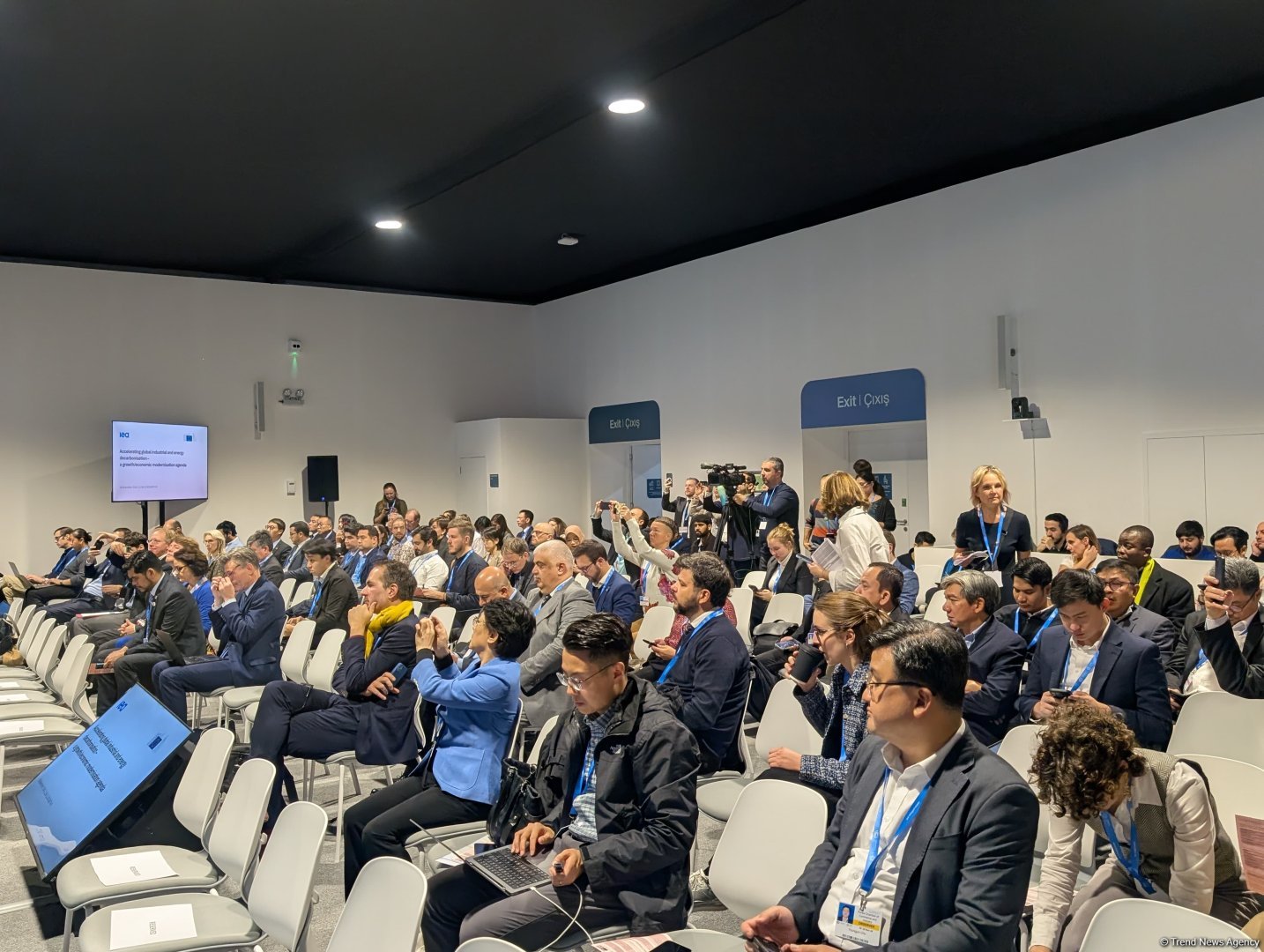BAKU, Azerbaijan, November 18. A panel discussion on the topic "Accelerating global industrial and energy decarbonization – a growth/economic modernization agenda" is taking place as part of COP29 in Baku, Azerbaijan, Trend reports.
Vice President for Infrastructure at the World Bank (WB) Guangzhe Chen said that in order to reduce risks associated with the transition to net-zero emissions, action is needed in four key areas.
Chen emphasized that the World Bank recognizes the challenges that emerging markets and developing economies face in reaching net-zero emissions by 2050.
"The World Bank (WB) estimates that transitioning complex industries in emerging markets and developing economies to zero emissions by 2050 will require overcoming numerous challenges. A key obstacle is reducing the risks associated with such investments, which are often viewed as high risk. To address this, the WB has identified four critical strategies. The first is the establishment of effective carbon pricing. The third focuses on fostering innovation and advancing technology,” he said.
He highlighted that carbon pricing is a powerful tool for reducing emissions, as it addresses the cost disparity between green technologies and fossil fuels.
"However, its implementation faces challenges, particularly the impact on export-oriented industries. The European Union has proposed a carbon border mechanism to prevent carbon leakage. Government support is crucial in bridging the price gap. While developed countries are implementing large-scale programs, developing countries are receiving support through international initiatives such as carbon investment funds and green procurement. For example, Brazil will include green procurement in its new industrial policy," he added.
Chen also stressed the importance of innovation, stating that nearly half of the emissions reductions required by 2050 will depend on non-commercial technologies.
Malaysia's Minister of Natural Resources and Environmental Sustainability Nik Nazmi Bin Nik Ahmad noted that Malaysia aims to achieve a 70 percent share of renewable energy by 2050.
"This year, we announced a more ambitious climate goal – to achieve carbon neutrality by 2050. For a relatively young industrial country like Malaysia, this is a challenging task that requires significant changes in policy and economic structure. However, we aim to become a beacon of ambition for the Southeast Asia region. This region is especially vulnerable to climate change, and we want to contribute," he explained.
"One of our key steps has been a clear commitment to the path toward achieving carbon neutrality. Currently, the share of renewable energy in our energy system is 25 percent, but by 2050, we aim to reach 70 percent," he added.
European Commissioner for Climate Action said that for the next five years, the European Union will focus on implementation and investment to achieve its goal of reducing emissions by at least 55 percent by 2030 and reaching climate neutrality by 2050.
Hoekstra emphasized that the past five years have been focused on developing and implementing the European Green Deal, which established legally binding targets for emission reductions and climate neutrality.
“We have set legally binding targets to reduce emissions by at least 55 percent by 2030 and to achieve climate neutrality by 2050.
Over the next five years, the EU will focus on implementation and investment to meet these goals. As we enter a new political term, our priority in the first hundred days will be to address exactly what we are discussing today—how to integrate climate action with economic policy. We will achieve this by presenting what we call 'a new deal for clean industry’.
I am confident this deal will drive investment and industrial growth in Europe. For example, by simplifying and accelerating the approval of clean technologies, attracting both public and private capital, enhancing workforce skills, and supporting clean tech innovations. Most importantly, we will ensure that clean energy becomes more accessible and affordable, as this will be the core issue moving forward," he said.
To note, the 29th session of the Conference of the Parties to the UN Framework Convention on Climate Change (COP29), which will run until November 22, opened at the Baku Olympic Stadium on November 11. It is the largest event organized by Azerbaijan to date, and the first time in the region that it is being held in Azerbaijan.
Within COP29, the highest level event - the summit of world leaders on climate action – was held on November 12–13.
The main expectation from COP29 is to agree on a fair and ambitious New Collective Quantitative Goal (NCQG) on climate finance. The COP29 chairmanship has launched 14 initiatives that include linkages between climate action and the Sustainable Development Goals, including green energy corridors, green energy storage, harmony for climate resilience, clean hydrogen, methane reduction in organic waste, action on green digital technologies, and other topics.
In addition to being a top priority that creates the conditions for action, creating climate finance will also help fulfill the 1.5°C pledge by bringing everyone together.
The UN Framework Convention on Climate Change is an agreement signed at the Rio Earth Summit in June 1992 to prevent dangerous human interference in the climate system. The acronym COP (Conference of Parties) stands for “Conference of Parties” and is the highest legislative body overseeing the implementation of the Framework Convention on Climate Change.
A total of 198 countries are parties to the Convention. Unless otherwise decided by the parties, COP is held annually. The first COP event was held in March 1995 in Berlin, and its secretariat is located in Bonn.
Stay up-to-date with more news on Trend News Agency's WhatsApp channel










